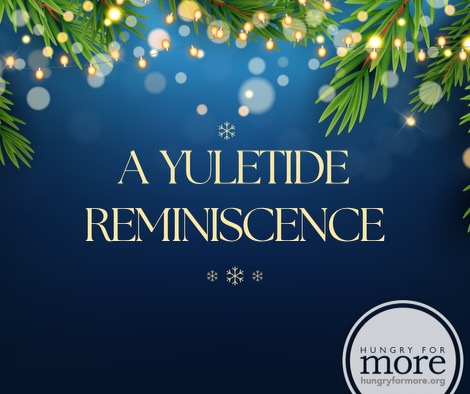Yellowed pages fluttered to the ground as I opened the manila folder. Like the sugarplum fairies of dreams, memories danced into my mind when I recognized the font. A simple Christmas dialog written on a borrowed typewriter in the Texas hill country one December.
As I bent to gather the pages into my hands, recollections of a nineteen-year-old-me arose with a clatter. Transported through time, a flashback landed me at the end of a busy college semester. And it came to pass in those days that a children’s lit assignment awaited, needing three short selections of unified themes by various authors. Each reader was to perform a prose piece, a poetry piece, and a piece of strict dialog in class within ten minutes.
Despite the week that loomed ahead, my heart fixed its thoughts on a pending homegoing. A rural yuletime awaited me, complete with history, sentimentality, and love. Christmas, already on my mind, would also be on my lips.
For my assignment, I effortlessly chose a few pages from Marjorie Holmes’ novel called “Two From Galilee: The Story of Mary and Joseph.” Like Mary, I, too, had words treasured in my heart since I was fourteen. Mine just happened to be sourced from a fictional account of Jesus’ birth. Holmes’s pages captured my imagination and made me want to repeat the sounding joy as I read her words:
“And He came forth out of her, out of Mary, His mother. Thus, in blood and pain, He came into the world, this Son of God who was also man and the Son of man. And when He squirmed in Joseph’s arms and uttered His first cry, the thrill of all mankind ran through both of them, for this was life, human life, and they knew that a miracle had been achieved.”
Since every great carol began as verse, I found my poetry in a hymnal. Buried in a pen date of 1700, Nahum Tate’s paraphrased poem of Luke 2:8-14 precisely expressed peace on the earth and goodwill to men.
“While shepherds watched their flocks by night,
All seated on the ground,
The angel of the Lord came down,
And glory shone around.
“To you, in David’s town, this
Is born of David’s line
The Savior, who is Christ the Lord;
And this shall be the sign:
“The heavenly Babe you there shall find
To human view displayed,
All gently wrapped in swaddling clothes,
And in a manger laid.”
And there, my progress halted. Without the internet and instant references, my search for an adequate dialogue proved as arduous as the Magi’s journey. My reading, with its essential middle and end, had no beginning. No mention of Gabriel’s visit. No reference to Mary’s surprise. Something was missing.
The library proved ineffectual and the bookstore unproductive, so I returned to my room for a long winter’s nap. But, the Lord regarded my lowly estate, and I dreamt the solution. I would write my own dialog, adding a counterfeit pen name I no longer recall.
Today, as nostalgia returns me to the present, I gaze upon those tattered pages of long ago:
“Gabriel: ‘I do understand Mary. I know you are a virgin. That’s why you’ve been chosen by God. The Holy Spirit will come upon you and give life to that unfertilized seed with you. Your Son shall be the Son of God, as well as man. God made your womb. What is to hinder Him from placing a special zygote within you? Nothing is impossible with God.’
“Mary: ‘I must admit it doesn’t make sense. It’s kind of a challenge — bearing God’s Son. What shall the boy be like?’
“Gabriel: ‘He shall be very great and called the Son of the Highest. The Lord God shall give Him the throne of His ancestor David, and He will reign over Israel forever: His Kingdom shall never end.’
“Mary: ‘Are you sure I’m capable of taking on the responsibility of a boy like this?’
“Gabriel: ‘The Lord is with you, Mary. With Him, you are enough.'”
Despite amateur wording and inadequate skill, I smiled, knowing the truth of Christmas remains. Emmanuel, God with us has come. And with Him, we are enough.

